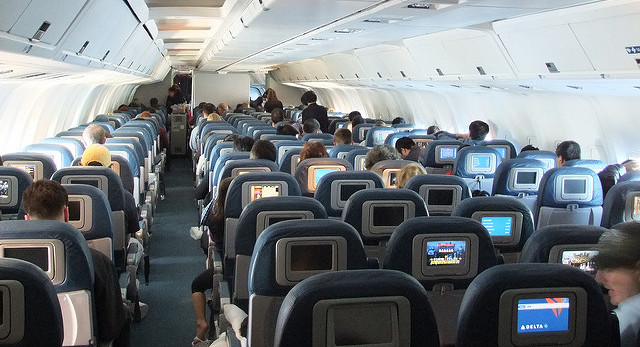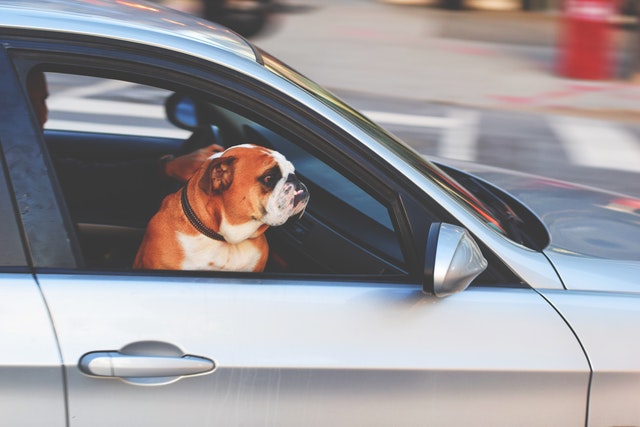Archive for the ‘News’ Category
Delta carries approximately 250,000 Service and Emotional Support Animals each year. However, as of March 01, 2018, they are tightening their policy for these working animals in an effort to reduce “misbehavior” by dogs (and other creatures). Although the carrier is required by law to admit Service animals and ESA’s into the cabin of the craft, they can and are putting extra rules into place.
What is the new policy? How does this affect those with disabilities that need a Service Dog? Read on for the important facts you will need to know before you book your next flight with Delta.
What is a Service Animal?
There is a difference between a Service Animal and an Emotional Support Animal. Service animals are typically dogs that have been trained to perform a specific task for an individual with a disability. This can be any number of things from picking up dropped items to opening doors, to alerting the person to an oncoming medical situation.
The Emotional Support Animal, on the other hand, is there only to provide the individual with comfort and support. These can be of any species of animal and do not need to be trained for a specific service, other than comfort.
Why is Delta Changing Their Service Dog Policy?Delta has seen a surge of 150 percent in service animals (that by Federal law must be allowed to fly uncaged and at no additional cost to the passenger) since 2015. However, there have been incidences of customers “attempting to fly with comfort turkeys, gliding possums known as sugar gliders, snakes, spiders and more.”
This has increased the complaints from Delta passengers concerning allergies, and other disturbances, as well as abuse to the Service Dog policy, with some of these clients just trying to fly their pets for free.
With an average of more than 200 service animals and 500 support animals flying on a daily basis, and the fact that in-flight incidences with these types of animals have risen 84 percent since 2016, Delta felt the need to change-up their policies.
Delta said; More untrained animals are being brought onto planes, where they urinate, defecate, bark, growl, lunge and exhibit other behavior uncommon among companions that are properly taught.”
What is the New Delta Policy Regarding Service Dogs and Emotional Support Animals?As of the first of March 2018, Delta will require all passengers with service dogs or emotional support animals to submit proof of health or vaccinations. This will have to be done through Delta’s website 48 hours before flight time.
Those customers requiring an ESA or Psychiatric Service Animal must (in addition to the health record) sign a document stating the animal’s “ability to behave in the cabin or risk being barred from boarding or removed from the plane.”
However, Delta does not require any proof that the animal has graduated from obedience school. But be aware that you will need to provide a letter prepared and signed by your licensed mental health professional explaining why you need an ESA to accompany you on the flight.
Where can I get the new Delta service dog forms?
Before you fly with Delta, be sure to visit their website to download the proper forms you will need before your flight. The new Delta service dog travel forms can be accessed here.
Behaviors Delta Will Not TolerateWith these stricter policies, Delta urges those folks traveling with animals in the cabin of the aircraft to have their “working” animals under control at all times. Behaviors that will not be tolerated include;
Growling Jumping on passengers Relieving themselves in the gate area or cabin Barking excessively, not in response to a handler’s need or distress Eating off seat back tray tablesDelta reserves the right to refuse transportation for any animal exhibiting unruly behavior.
Conclusion
If you are planning a trip on Delta airlines and need a Service or an Emotional Support Animal, be sure to have your animal’s health or proof of vaccination certificate. If you are traveling with an ESA or psychiatric service animal, you will also need a note from your mental health professional stating your need for the animal. Be sure to visit Delta’s website for further downloads and let them know you will be traveling with a “working” animal 48 hours prior to your flight. To register your service animal and receive your service dog certification, complete the registration in the link below.
Uber is working to make catching a ride easier, safer, and always a five-star experience. They connect the rider with affordable transportation anytime, anywhere, all at a tap of a button. You can also see your driver’s contact information and the vehicle’s details in the app, so you will always know you’re getting into the right car.
This company is working towards making the most affordable and pleasant experience they can when it comes to using this type of transportation, and that includes working with those folks that need a Service Animal.
In this post, we will cover Uber’s Service Animal policies in both the United States and Canada, so that you can ride in style and with peace-of-mind.
Does Uber Allow Service Animals?US and Canada Uber drivers must allow service animals in their vehicles. If you experience discrimination, please contact Uber customer service.
In both the United States and Canada, Uber does allow Service Animals into their vehicles. However, be aware of their definition of “service.”
According to Uber’s website, a Service Animal is one that assists the person with a disability that is both visible and nonvisible.
What Are the Uber Rules in the United States Regarding Service Animals?Uber in the United States does allow Service Animals in their vehicles as both state and Federal laws prevent the discrimination against these working animals.
In the US, Uber defines a Service Animal as one that is trained to perform tasks for an individual with a disability.
There are only two questions a driver may ask the disabled individual to confirm his/her need for the Service Animal;
1. Is the animal required because of a disability? 2. What work or task has the animal been trained to perform?Note: The driver-partner may not request that the rider present documentation proving that the rider’s animal is a Service Animal. In the United States, there is also no requirement that a Service Animal must wear a tag, be registered, or display any proof that it is a Service Animal.
If you require a Service Animal and are refused entry to an Uber due to having one, the driver-partner will be permanently banned from using the Driver app.
There are also no cleaning fees charged for the shedding of a Service Animal or the first and second reported incidences of its bodily fluids. However, you may be charged a cleaning fee for the third reported incident of bodily fluids emitted by your Service Animal.
What Are the Uber Rules in Canada Regarding Service Animals?If your Uber driver does not accept your Service Animal, you can contact Uber’s customer service.
There are two ways that Uber will qualify an animal as a Service Animal in Canada;
1. The animal is easily identified as a service animal. For example, it is wearing a service vest or harness and is helping the individual. 2. The person may also present documentation confirming the animal is a Service Animal. This could be in the form of a letter from a health professional stating that the animal is needed due to a disability, a government-issued Service-Animal card, or, in Quebec, a certificate from a Service-Animal training school.Note: In Canada, a driver may ask to see this documentation.
Canadian laws prohibit Uber driver-partners using the Driver App from discriminating against riders with Service Animals.
If a driver refuses to give the rider service due to a Service Animal, it is considered to be a discriminatory act, and they will lose their ability to use the Driver app.; as explained in Uber’s Non-Discrimination Policy,
“Riders cannot be charged cleaning fees for shedding by their service animals. Riders will be refunded any cleaning fees charged for shedding by their service animals.
A rider will not be charged for the first or second reported mess involving a service animal’s bodily fluids. A rider can be charged for the third reported mess involving a service animal’s bodily fluids. The rider may contest that such a mess occurred by responding to the fee notification email to notify customer support.”
Riding With “Non-Service” AnimalsThe definition of “Service Animal” within the Uber policy is well-defined. Therefore an Emotional Support Animal would not fall under this definition. According to their website, when riding with “non-service” animals they suggest it’s good practice to contact the driver who accepts your ride request. Using your app, send a text message or call to let the driver know you’d like to bring a pet.
They also suggest you bring a crate or blanket to help reduce the risk of damage or mess. Some drivers may keep a blanket in the trunk.
Conclusion
Both the United States and Canada will accept the Service Animal in the Uber, but both regions also have their requirements; this is especially important to know if you are traveling from one country to the next. Know your rights when it comes to bringing your Service Animal in an Uber and plan accordingly.
Humans are lucky to have dogs as our companions. Dogs used to help us watch livestock or help us hunt. Now, they are here to provide us with much-needed support. Unfortunately, people often get assistance animal regulations wrong. We are here to help clear things up. The first step is to understand the rules and regulations around assistance animals.
Can I Register my Dog as a Therapy Dog?There are three types of assistance animals. Each performs a specific function and has special access rights.
Service Animal – trained to perform a specific task for their handler’s disability. Service Dogs have full access to all public places, including restaurants, hotels, and no-pet housing. A fee cannot be a charge for granting access to Service Dogs. A service dog is considered a medical device and not a pet. Emotional Support Animal – does not require special training and provides comfort to their handler. Emotional Support Dogs have access to no-pet housing, and the landlord cannot charge a fee for an ESA as well. Therapy Animal – does not require special training and provides comfort to others. Therapy Dogs do not have special access and must be invited in. A fee can be charged for granting access to a therapy dog.Share this image on your site (copy code below): <div style="clear:both"><a href="https://www.servicedogcertifications.org/how-to-register-a-therapy-dog/" target="_blank"><img decoding="async" style="max-width:100%;margin:0 0 10px;" src="https://www.servicedogcertifications.org/wp-content/uploads/2017/05/service-dog_esa_therapy-dog.jpg" title="3 Types of Assistance Animals" alt="Infographic comparing service dogs, emotional support dogs, and therapy dogs" border="0" data-src="" /></a></div> Copy
You can register your dog as a therapy dog by following the links below!
Therapy Animals are often confused with Emotional Support Animals. A quick way to discover which assistance animal you need is to ask yourself a simple question.
Is my dog here to support my emotional needs or is my dog her to support other’s emotional needs? If the answer is yourself, you require an ESA Letter from a therapist. If your answer is others, your require a Therapy Dog Certification. Train and register your dog as a Therapy Dog in 3 Easy Steps – First – Adopt and train a dog with a calm and kind temperament and can pass a Canine Good Citizen Test. Second – Train your dog to be well-behaved in public places such as a hospital or school. When they go to a hospital or school, they need to be well-behaved as to not hurt others or themselves. Third – Certify your Therapy Dog by registering them with Service Dog Certifications Register your therapy dog hereYour Therapy Dog can also act as your Emotional Support Dog. To qualify your Therapy Dog as your ESA, you will need an ESA letter from a therapist. If your current therapist understands ESA laws and can help you write an ESA letter, this is your best route. If you do not have access to an ESA Doctor or ESA therapist, we recommend seeking support for a legitimate ESA resource.







